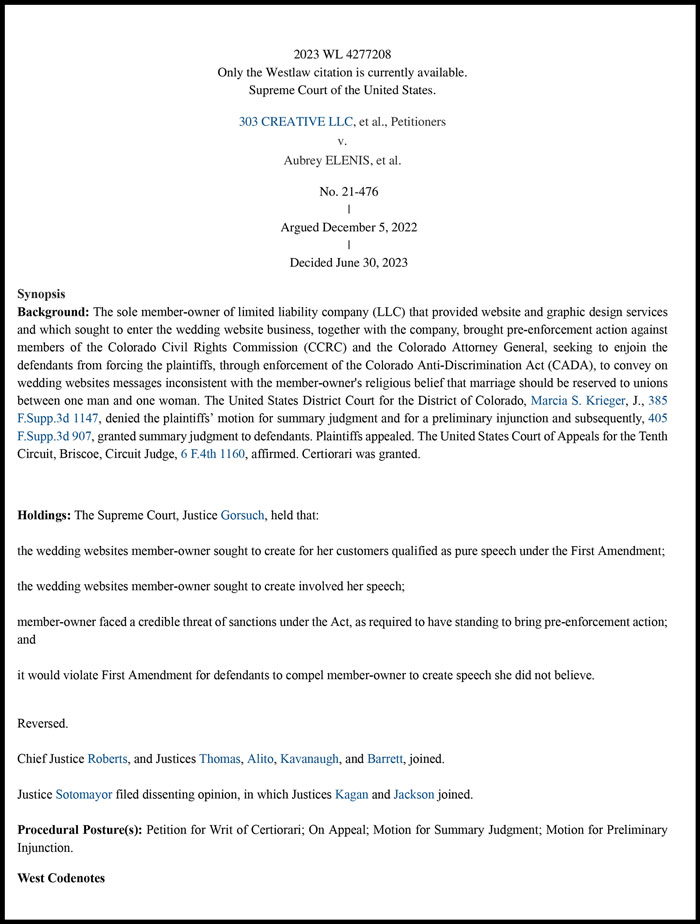SCOTUS Ruling Could Lead to Discrimination Against Others

The US Supreme Court delivered a landmark decision this week in a case where a website creator preemptively sued the state of Colorado for the right to turn away same-sex couples based on her own religious beliefs, establishing new boundaries between freedom of expression and discrimination claims that could potentially result in more discrimination against others based on a variety of characteristics.
The verdict has spurred significant debate among legal experts and civil rights advocates.
The case was filed by 303 Creative LLC, a graphic design studio specializing in custom artwork, whose owner objects to Colorado's Anti-Discrimination Act that prohibits businesses from denying “the full and equal enjoyment” of its goods and services to someone based on his race, creed, disability, sexual orientation, or other statutorily enumerated trait.
The owner of 303 Creative, Lorie Smith, a devout Christian who wants to expand her business to include online wedding announcements, sued to seek injunctive relief from the law that she said could force her to provide wedding messages for same-sex couples which would be inconsistent with her religious belief that marriage should be reserved to unions between one man and one woman.

Read the entire Supreme Court decision here.
https://shorturl.at/absxC
Smith had not actually been forced to create any such websites, but she sued the state to protect herself from ever being charged with discrimination if she ever turned away any such clients.
The Supreme Court's 6-3 majority ruling along political lines determined that 303 Creative LLC had the right to decline same-sex couples' requests based on her sincerely held religious beliefs about marriage. The decision reversed the appellate court decision that had denied Smith's injunctive relief.
Chief Justice Roberts, along with Justices Alito, Barrett, Gorsuch, Kavanaugh, and Thomas voted in favor of the ruling. Justices Kagan, Jackson, and Sotomayor opposed the decision. Justice Gorsuch wrote the majority opinion and Justice Sotomayor filed the decent.
Justice Neil Gorsuch, writing for the majority, held that Smith's 1st Amendment right of free speech would be violated if she were forced to create messages that are not consistent with her own views.
"Ms. Smith seeks to engage in protected First Amendment speech; Colorado seeks to compel speech she does not wish to provide," the opinion states.
The Court articulated the difference between "expressive" work like what Smith intends to offer, as opposed to general services offered to the public like most businesses. The courts ruled that adding her own design and writing to the clients' messages is like artists and other creators expressing themselves through their work, even if being paid for it.
The court's decision drew both praise and criticism from various quarters.
Supporters of the ruling argue that it upholds the principles of religious freedom enshrined in the Constitution. They contend that individuals should have the right to refrain from participating in activities that contradict their own religious beliefs.
On the other hand, opponents argue that the decision provides a dangerous precedent, potentially allowing businesses to discriminate against marginalized communities under the guise of religious freedom.
Legal experts note that the Supreme Court's decision has clarified the boundaries between freedom of expression and anti-discrimination laws. It remains to be seen how lower courts will apply this ruling in future cases, and whether state legislatures will seek to revise their anti-discrimination laws to provide more comprehensive protections.
The impact of this ruling extends beyond the immediate parties involved.
The case highlights the ongoing tensions between religious liberty and equal treatment under the law, an issue that has persistently divided the country. The decision will likely fuel further debates and discussions surrounding the balance between religious beliefs and the rights of marginalized groups.
Civil rights advocates worry that similar arguments could be used by businesses to discriminate against customers who are mixed-race couples, of different religious faiths, or even non-religious people, for example.
The case was filed by Smith against Aubrey Elenis, director of the Colorado Civil Rights Division that enforced anti-discrimination laws, as well as Philip J. Weiser. Colorado's State Attorney General.






